Dispersion force - Study guides, Class notes & Summaries
Looking for the best study guides, study notes and summaries about Dispersion force? On this page you'll find 597 study documents about Dispersion force.
All 597 results
Sort by
 Popular
Popular
-
Test Bank for Fundamentals of Physics, Extended, 12th Edition by David Halliday
- Exam (elaborations) • 957 pages • 2024
-
- $29.49
- 2x sold
- + learn more
Test Bank for Fundamentals of Physics, Extended, 12e 12th Edition by David Halliday, Robert Resnick, Jearl Walker. Full Chapters test bank are included - Chapter 1 to 44 1 Measurement 1 1.1 Measuring Things, Including Lengths 1 1.2 Time 5 1.3 Mass 6 2 Motion Along a Straight Line 13 2.1 Position, Displacement, and Average Velocity 13 2.2 Instantaneous Velocity and Speed 18 2.3 Acceleration 20 2.4 Constant Acceleration 23 2.5 Free-Fall Acceleration 28 2.6 Graphica...
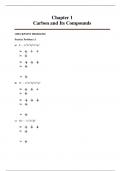 Popular
Popular
-
Solution Manual for Organic Chemistry Mechanistic Patterns Canadian 1st Edition Ogilvie Ackroyd Br
- Exam (elaborations) • 809 pages • 2024 Popular
-
- $48.48
- 1x sold
- + learn more
Chapter 1 Carbon and Its Compounds CHECKPOINT PROBLEMS Practice Problem 1.1 a) S — 1s2 2s2 2p6 3s2 3p4 b) Cl — 1s2 2s2 2p6 3s2 3p5 c) Na+ — 1s2 2s2 2p6 1-2 Copyright © 2018 Nelson Education Limited Practice Problem 1.2 a) Count valence electrons. Build a basic bonding framework and account for electrons used. Add remaining electrons and check for formal charges. The molecule has a lone pair on the nitrogen. All other electrons are bonding electrons. b) Count valence...
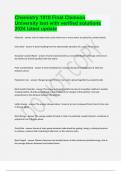
-
Chemistry 1010 Final Clemson University test with verified solutions 2024 latest update.
- Exam (elaborations) • 10 pages • 2024
-
Available in package deal
-
- $14.99
- 1x sold
- + learn more
Molecule Unit of matter that results when two or more atoms are joined by covalent bonds Ionic Bond A bond resulting from the electrostatic attraction of a cation for an anion. Brainpower Read More Nonpolar Covalent Bond A bond characterized by an even distribution of charge; electrons in the bonds are shared equally by the two atoms Polar Covalent Bond A bond resulting from unequal sharing of bonding pairs of electrons between atoms Polyatomic Ions Charged g...
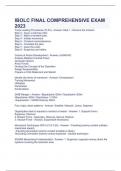
-
IBOLC FINAL COMPREHENSIVE EXAM 2023
- Exam (elaborations) • 4 pages • 2023
-
Available in package deal
-
- $9.99
- 1x sold
- + learn more
Troop Leading Procedures (TLPs) - Answer- Step 1 - Receive the mission. Step 2 - Issue a warning order. Step 3 - Make a tentative plan. Step 4 - Initiate movement. Step 5 - Conduct reconnaissance. Step 6 - Complete the plan. Step 7 - Issue the order. Step 8 - Supervise and refine. Course of Action Development - Answer- (AGADAP) Analyze Relative Combat Power Generate Options Array Forces Develop the Concept of the Operation Assign Responsibility Prepare a COA Statement and Sketch ...
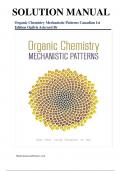
-
Solution Manual for Organic Chemistry Mechanistic Patterns Canadian 1st Edition by Ogilvie Ackroyd Br
- Exam (elaborations) • 811 pages • 2024
-
- $19.99
- 1x sold
- + learn more
Chapter 1 Carbon and Its Compounds CHECKPOINT PROBLEMS Practice Problem 1.1 a) S — 1s2 2s2 2p6 3s2 3p4 b) Cl — 1s2 2s2 2p6 3s2 3p5 c) Na+ — 1s2 2s2 2p6 1-2 Copyright © 2018 Nelson Education Limited Practice Problem 1.2 a) Count valence electrons. Build a basic bonding framework and account for electrons used. Add remaining electrons and check for formal charges. The molecule has a lone pair on the nitrogen. All other electrons are bonding electrons. b) Count valence electrons. Build a bas...
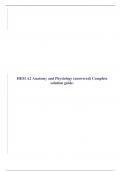
-
HESI A2 Anatomy and Physiology (answered) Complete solution guide.
- Exam (elaborations) • 50 pages • 2023
- Available in package deal
-
- $10.00
- 1x sold
- + learn more
HESI A2 Anatomy and Physiology. 1. Anatomic position 2. Which of the following is a structure found in the upper respiratory? 3. A person who has damage to their ulnar nerve will have decreases sensation in 4. Which bone dose not articulate with any other bone? 5. Which of the following statements best describe endocrine glands? 6. Diet is important because bone are storage places for 7. Which organ is part of both the male reproductive system and the urinary system? 8. Red blood cell production...
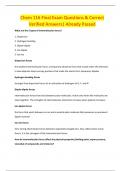
-
Chem 116 Final Exam Questions & Correct Verified Answers| Already Passed
- Exam (elaborations) • 14 pages • 2024
-
- $12.99
- + learn more
What are the 5 types of intermolecular forces? 1. Dispersion 2. Hydrogen bonding 3. Dipole-dipole 4. Ion-dipole 5. Ion-Ion Dispersion forces the weakest intermolecular force; a temporary attractive force that results when the electrons in two adjacent atoms occupy positions that make the atoms form temporary dipoles Hydrogen bonding forces stronger than dispersion forces its an attraction of hydrogen to O, F, and N Dipole-dipole forces intermolecular forces that exist between polar m...
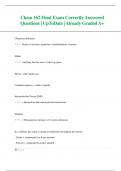
-
Chem 162 Final Exam Correctly Answered Questions| UpToDate | Already Graded A+
- Exam (elaborations) • 102 pages • 2024
- Available in package deal
-
- $14.49
- + learn more
Chemistry definition : Study of structure, properties, transformations of matter Matter : Anything that has mass + takes up space Phases: solid, liquid, gas Condensed phases = solids + liquids Intermolecular Forces (IMF) : = Interactions between molecules/atoms/ions Solution : = Homogenous mixtures of 2+ pure substances In a solution, the solute is dispersed uniformly throughout the solvent - Solute = compound(s) in lesser amount - Solvent = compound in greater amount 2 | P a g e E...
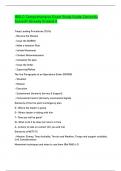
-
IBOLC Comprehensive Exam Study Guide Correctly Solved!! Already Graded A
- Exam (elaborations) • 19 pages • 2024
-
- $13.99
- + learn more
IBOLC Comprehensive Exam Study Guide Correctly Solved!! Already Graded A Troop Leading Procedures (TLPs) - Receive the Mission - Issue the WARNO - Make a tentative Plan - Initiate Movement - Conduct Reconnaissance - Complete The plan - Issue the Order - Supervise/Refine The five Paragraphs of an Operations Order (OPORD) - Situation - Mission - Execution - Sustainment (formerly Service & Support) - Command & Control (formerly command & Signal) Elements of the five point contingen...
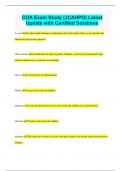
-
COA Exam Study (JCAHPO) Latest Update with Certified Solutions
- Exam (elaborations) • 6 pages • 2024
-
Available in package deal
-
- $8.99
- + learn more
COA Exam Study (JCAHPO) Latest Update with Certified Solutions A-scan An ultrasound technique to determine the axial length of the eye to calculate the intraocular lens power required. Abbe number An indication of optical quality. Number is inversely proportional to the chromic dispersion of a specific lens material Abcess Localized area of inflammation Abduct to turn away from the midline Abductor A muscle that rotates the eye away from the midline (e.g. lateral rectus) Abe...
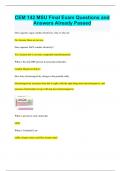
-
CEM 142 MSU Final Exam Questions and Answers Already Passed
- Exam (elaborations) • 26 pages • 2024
- Available in package deal
-
- $9.99
- + learn more
CEM 142 MSU Final Exam Questions and Answers Already Passed Does aqueous sugar conduct electricity, why or why not No, because there are no ions Does aqueous NaCl conduct electricity? Yes, because this is an ionic compound (metal/nonmetal) What is the only IMF present in non polar molecules London Dispersion Forces How does electronegativity change in the periodic table Electronegativity increases from left to right (with the right being most electronegative), and increases from bo...

Study stress? For sellers on Stuvia, these are actually golden times. KA-CHING! Earn from your study resources too and start uploading now. Discover all about earning on Stuvia


